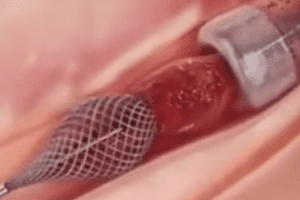
Heart Stents No Better than Drugs. An international team of researchers just reported in the New England Journal of Medicine that while using drugs alone may take longer than angioplasty or stent surgery to help restore blood flow in patients with clogged arteries, patients fare just as well in the long term. PCI, or percutaneous […]

Heart Stents No Better than Drugs. An international team of researchers just reported in the New England Journal of Medicine that while using drugs alone may take longer than angioplasty or stent surgery to help restore blood flow in patients with clogged arteries, patients fare just as well in the long term. PCI, or percutaneous coronary intervention, is the surgery that offers increased short-term relief for some patients with severe or more frequent chest pain. PCI benefits tend to diminish in time according to the researchers.
The team assessed 2,287 volunteers in 50 U.S. and Canadian medical centers as part of its COURAGE—Clinical Outcomes Utilizing Revascularization and Aggressive Drug Evaluation—study. Last year, the group reported that patients taking medication alone for chest pain known as angina and for heart disease are no more likely to die or have a heart attack during the follow-up period of 30 to 84 months versus those who also received PCI.
“COURAGE demonstrates that both treatment strategies can have a profoundly positive effect on patients’ health status and suggests complementary roles—optimal medical therapy—as first-line therapy, with PCI reserved for patients who do not have a response or who have severe baseline symptoms,” wrote Dr. Eric Peterson of Duke University Medical Center in Durham, North Carolina, and John Rumsfeld of the Denver Veterans Affairs Medical Center, in a commentary.
“You can say to patients, ‘you won’t be at increased risk if we don’t put a stent in that blockage right now,”‘ said Dr. William Weintraub of Christiana Care Health System in Newark, Delaware, who led the study.
Weintraub and his colleagues found that PCI recipients experienced more immediate relief from chest pain and felt fewer physical limitations; however, after one year, that impact began to change and by three years, no meaningful difference could be determined between those receiving PCI and those taking medications.
The team calculated that if all patients received the best drug therapy, adding PCI would only provide significantly improved chest pain relief in about one of every 17 patients; for every 25 patients who received the PCI procedure, only two such patients would experience significantly improved quality of life. Of the patients studied, only about 21 percent of those who initially received drug treatment alone underwent PCI surgery.
In their commentary, Peterson and Rumsfeld did mention that PCI surgery does carry extra risks. For instance, for every 1,000 patients initially treated with PCI surgery, approximately two would die, 28 would suffer a heart attack associated with the surgery, 60 to 90 would show improvement, and at least 800 patients would not experience any difference in response as compared to receiving drug treatment.
A cost comparison of the drug and PCI therapies has not yet been compared. “It is difficult to assert that a PCI-first strategy should clearly be adopted routinely in patients with stable angina,” they wrote.
Weintraub and several of the other researchers reported having been paid consulting fees and grants from many different drug companies for conducting the research.
The personal injury attorneys at Parker Waichman LLP offer free, no-obligation case evaluations. For more information, fill out our online contact form or call 1-800-YOURLAWYER (1-800-968-7529).


